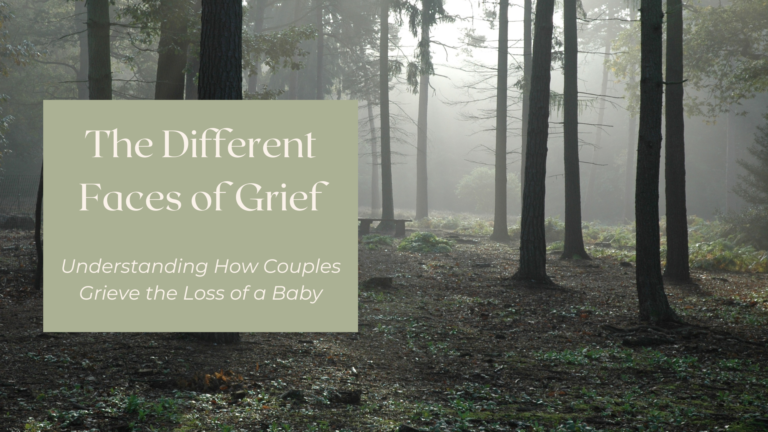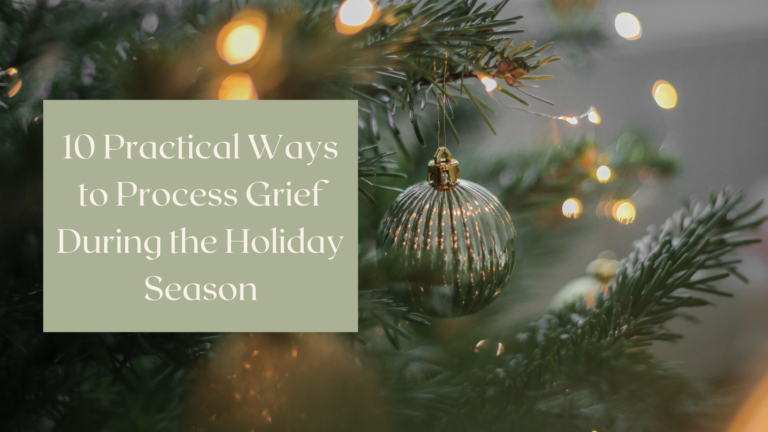What Does Christian Grief Look Like After Pregnancy Loss?
This is a big question, and it’s one that you might be asking yourself after experiencing pregnancy loss. Whether you had a miscarriage, delivered a stillborn baby or have gone through infant loss, this question often haunts us.
What does grief look like when I don’t know if I trust God anymore? How could He allow this to happen? Understanding grief after pregnancy loss can feel like trying to navigate through a dense fog without a compass. As someone who has walked this path, I want to help you understand that your grief is not only normal—it’s essential. God sees your pain, holds your tears, and walks beside you through this valley.
What is Grief?
Grief is our natural response to loss, but after pregnancy loss, it can feel particularly complex. Unlike other losses where you have memories to hold onto, pregnancy loss grief often involves mourning dreams, hopes, and a future that never got the chance to unfold.
Not only do we miss the baby we had, but we also think about all of the future things we’re going to miss. First words, first steps, first day of Kindergarten, teaching them to drive, graduation…the list is truly endless. This type of grief is unique and deserves special acknowledgment.
Scripture shows us that grief is a normal part of the human experience. Jesus Himself wept at the tomb of Lazarus (John 11:35), even knowing He would raise him from the dead. David poured out his grief in the Psalms, showing us that we can be both faithful and broken-hearted. The Bible never tells us not to grieve—instead, it shows us how to grieve.
Common Experiences in Grief
Every grief journey is unique, but there are some common experiences that many women face after pregnancy loss. You might feel waves of sadness that come without warning. You might struggle with anger—even anger at God. I know this was a big one for me. You might feel isolated or misunderstood. All of these feelings are normal, and God can handle every emotion you’re experiencing.
Physical symptoms of grief are also common. You might experience changes in sleep patterns, appetite changes, or feel physically exhausted. Your body is processing grief alongside your heart, and it’s important to be gentle with yourself during this time.
I think the biggest difficulty for me was accepting that grief never goes away. Yes, it’s important to fully process the grief you’re feeling. Get angry, scream, cry and do what you need to do. But also know that grief isn’t something that we move through and then toss aside. Grief moves with us throughout our lives. I’ve found that grief often likes to show up at inopportune times, or when a random song comes on, or a holiday commercial. Grief is unpredictable, and it will always be there in some form.
The Relationship Between Grief and Faith
Sometimes, well-meaning Christians might suggest that strong faith means moving quickly through grief. However, deep faith and deep grief can coexist. In fact, our faith gives us permission to grieve honestly and fully. Psalm 34:18 reminds us that “The Lord is close to the brokenhearted and saves those who are crushed in spirit.”
God doesn’t expect us to handle grief alone. He provides several ways to find comfort and support through our faith journey. Prayer becomes especially important during grief, even when it feels different than before. Your prayers might be shorter, more raw, or even wordless groans—and that’s okay. God isn’t expecting this to be pretty. Romans 8:26 tells us that the Holy Spirit helps us pray when we don’t know what to say.
Reading Scripture can provide comfort, though you might need to approach it differently during grief. Instead of long study sessions, try focusing on single verses that speak to your heart. Write them down, carry them with you, or speak them aloud when grief feels overwhelming.
If you’d like, you can sign up to receive a coping guide and weekly encouragement in your email (including scripture cards you can simply print out and use).
While grief can make us want to isolate, God designed us for community. Finding support through your church family, Christian grief groups, or other mothers who have experienced loss can be crucial for healing. These connections remind us that we’re not alone and provide practical support during difficult days.

Practical Ways to Walk Through Grief
Understanding your grief is important, but having practical tools to walk through it is equally valuable. Start by creating space in your daily routine for grief. This might mean setting aside time each day to journal, pray, or simply sit quietly with your emotions.
Remembrance can be an important part of grieving. Consider creating a memorial box, planting a garden, or finding another meaningful way to honor your baby’s memory. These tangible expressions of remembrance can become sacred spaces for processing grief and celebrating the life of your child, however brief it was.
Taking care of your physical needs is also crucial during grief. Rest when you need to, eat nourishing foods, and be gentle with yourself. Remember that Jesus often withdrew to quiet places when He needed rest—this is a biblical model we can follow.
The Role of Time in Grief
I wanted to touch specifically on time because I think this topic can often be misunderstood. While time alone doesn’t heal grief, it does change how we carry it. In the early days, grief might feel all-consuming and incredibly heavy.
Gradually, most people find that grief begins to take a different shape. It doesn’t disappear, but it becomes more manageable. You might find yourself having more good days than bad, though grief can still surprise you with its intensity at times. Even years after loss, you may still have bad days and that’s completely okay.
As Christians, we grieve differently than those who have no hope (1 Thessalonians 4:13). I encourage you to crack open your Bible and read this verse (or Google it!) This verse doesn’t mean we grieve less—it means we grieve with the assurance that death is not the end of our story. We can trust that our babies are in God’s presence and that one day, we will see them again.
Moving Forward While Remembering
Moving forward after loss doesn’t mean forgetting. Instead, it means learning to carry your grief in a way that honors both your baby’s memory and God’s ongoing purpose for your life. You might find new ways to incorporate your baby’s memory into your life while still embracing the future God has for you.
Remember that grief is not a sign of weak faith—it’s a sign of deep love. Just as Jesus wept, we too can weep. Just as David poured out his heart in the Psalms, we too can pour out our hearts. And just as God was faithful to them, He will be faithful to us in our grief journey.
Your grief matters to God. Your baby matters to God. And as you walk this path, know that you never walk it alone.






